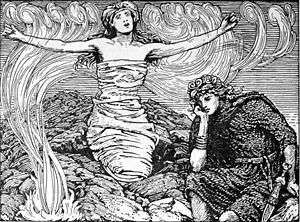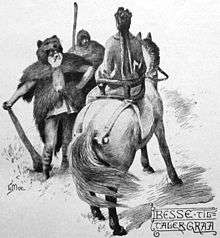Gróa

In Norse mythology, Gróa (Old Norse "growing"[1]) is a völva and practitioner of seiðr, the wife of Aurvandil the Bold.
Attestations
Prose Edda
Gróa appears in the Prose Edda book Skáldskaparmál, in the context of Thor's battle with the jötunn Hrungnir. After Thor has dispatched Hrungnir with the hammer Mjollnir, Gróa is asked to help magically remove shards of Hrungnir's whetstone which became embedded in Thor's head. Unfortunately while Gróa was about her work, Thor distracted her by giving her news of her husband's whereabouts (he had earlier helped Aurvandil cross the river Élivágar), telling her that her husband was now at home. Gróa's spell miscarried and the pieces of whetstone remained permanently embedded in Thor's head.
Poetic Edda

Gróa is also a völva, summoned from beyond the grave, in the Old Norse poem Grógaldr, (a section of Svipdagsmál), by her son Svipdagr. In death she has lost none of her prophetic powers, and is able to assist him in a successful conclusion of the task which he has been set by his cruel stepmother. It is possible that this second Gróa is the same as the first one.
Gesta Danorum

In Gesta Danorum, Gro is a woman saved from marrying a giant by King Gram. In Viktor Rydberg's elaborate theories on Norse mythology this Gro, too, is the same.
Notes
- ↑ Orchard (1997:63).
References
- Orchard, Andy (1997). Dictionary of Norse Myth and Legend. Cassell. ISBN 0-304-34520-2